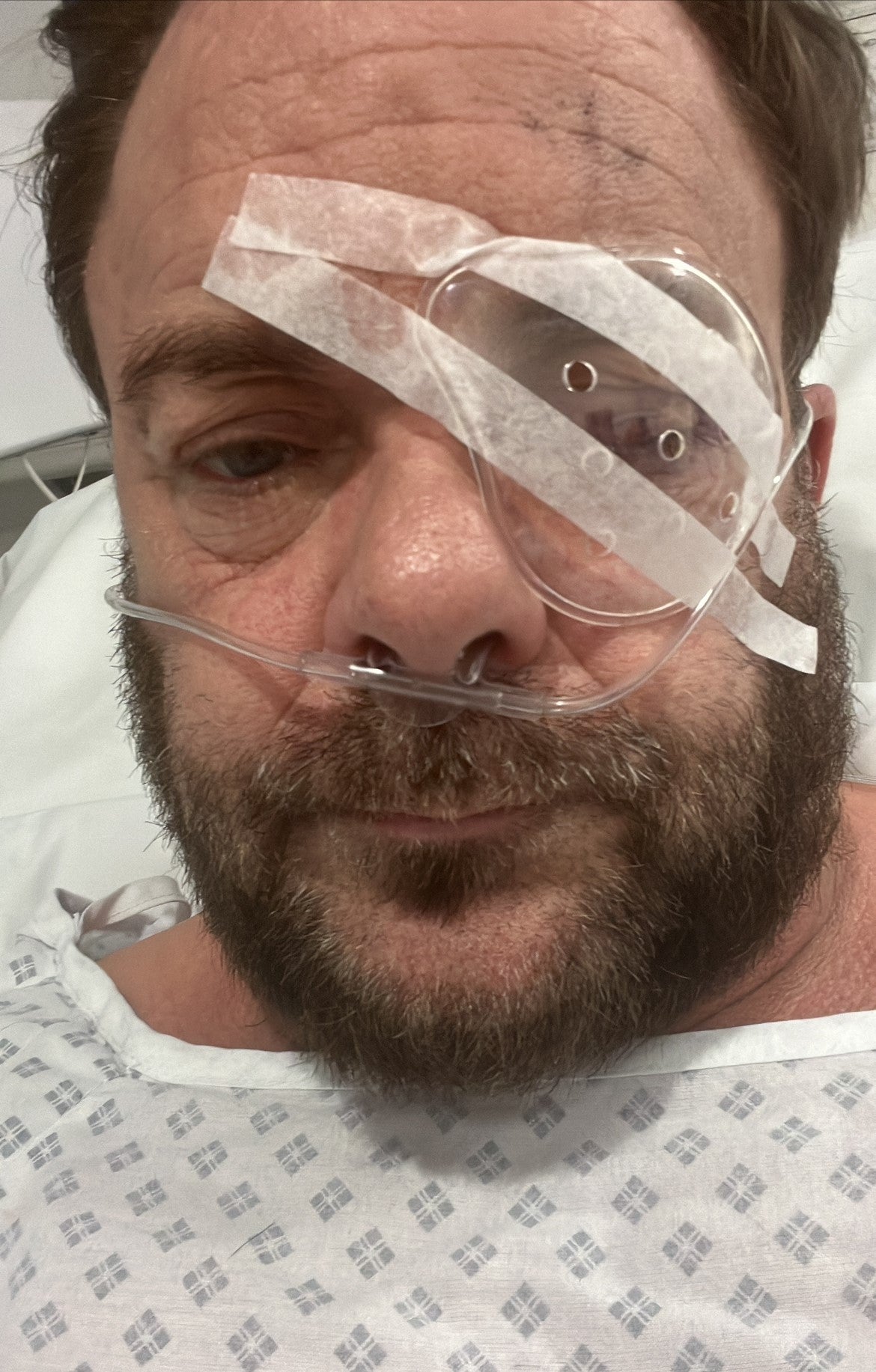Father partially blinded in drive-by chemical substance attack fears NHS not equipped for rise in incidents
Victim Spencer Gymer has issued the warning as latest figures show a 75 per cent increase in corrosive substance attacks in the UK

A father of three who was partially blinded by a moped rider who sprayed alkaline in his face fears the NHS is not equipped to deal with a wave of chemical attacks.
Spencer Gymer was stopped in car at traffic lights in Surbiton, in southwest London, when a motorcyclist wearing a balacava pulled up and shouted at him to wind down his window.
When the 49-year-old did, the moped rider produced a plastic water bottle and squirted alkaline liquid through a sports nozzle onto his face and body, before quickly driving away.
Emergency aid was given by firefighters before Mr Gymer was rushed to Kingston Hospital in an ambulance - but there, he said staff “didn’t know what to do”.
In a document seen by The Independent, a paramedic also reported staff at the hospital saying they did not have the facilities to treat the patient, and that there were just two nurses in the hospital’s urgent care centre.

“I was lying blinded in A&E and all I could hear was “we don’t know what to do with him” and “we don’t know where to send him”,” said Mr Gymer.
“Two nurses were next to me pouring liquid into my eyes, they weren’t sure what they were doing, and then one of them was removed to deal with another incident. My partner had to step in to help before a senior doctor arrived.”
Mr Gymer was sent home before a referral to Moorfields Eye Hospital at St George’s Hospital in Tooting the following day.
He has since received “brilliant” help from the hospital and is on the road to recovery following the incident on 19 January.
But he says the attack, followed by drama at the hospital, has left him with trauma - and he has urged the NHS to carry out better training and ensure staff have the equipment to deal with chemical attacks.
Last week, newly released data showed there were 1,244 incidents of acid attacks and other offences involving corrosive substances in the UK in 2023, up from 710 in 2022.
Last year’s incidents reported to police forces included 454 physical attacks along with other offences including rape and robbery. In London, 82 acid attack offences were recorded.
Acid Survivors Trust International, which obtained the data, called for greater awareness of the crime, and prevention in the same way that there was for gun and knife crime.
In January, Abdul Ezedi was suspected of attacking an ex-partner and her children with a corrosive substance in Clapham, south London. In all, 12 people needed hospital treatment after an attack with an alkaline substance in Lessar Avenue, which left the mother, 31, with injuries likely to be life changing.

Mr Gymer, who has three children aged 19, 15 and four, is waiting for an operation to take a stem cell from his right eye and place it in his left in a bid for him to regain his full sight again.
But Mr Gymer said the mental impact of what happened could take longer to heal. He is still waiting for a referral for trauma counselling, and has been told that the waiting is up to 14 months.
“We need more support from the moment of the attack to the recovery,” he said. “When you hear of the rise in attacks, we need the help for those victims.”
Under NHS advice, anyone who suffers acid or chemical burns needs to get treatment as soon as possible.
A spokesperson for Kingston Hospital NHS Foundation Trust said: “Our staff strive to provide the best possible care in our emergency department and are equipped and trained to deal with chemical attack victims arriving at the department.
“As is routine for such an injury, initial assessment and treatment would be carried out at Kingston Hospital, as was the case here, before an immediate referral is made to a specialist unit.
“Patient safety is our priority, and the management of such incidents forms a part of staff training and education at the trust.”
A spokesperson for NHS England London said it continued to improve its approach to dealing with chemical incidents.
The Met Police said all its officers are trained to provide first aid to victims and have treatment kits in all response vehicles.
In relation to the attack on Mr Gymer, a spokesperson said there had been no arrests and that the investigation was continuing.
Bookmark popover
Removed from bookmarks